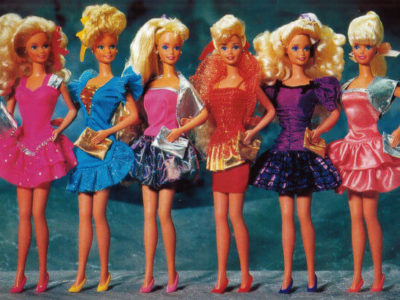Growing up, Barbie always won the popularity contest against the rest of my toys. My stuffed animals were cute and my play kitchen kept me entertained for hours, but Barbie was skinny, pretty, fashionable and tall—everything I aspired to look like. Perhaps the more time I spent with my friend Barbie, the more I would look like her. She even had a hot boyfriend named Ken. Maybe I could find myself a Ken someday if I grew up to look like Barbie.
Puberty hit me early. I wore training bras to conceal the fact that I didn’t exactly resemble a little girl anymore in the fifth grade. I donned baggy t-shirts and athletic pants despite my love for fashion. Hopefully nobody noticed I looked different from the other girls in my class.
But body’s changes brought ridicule from my peers. I no longer appeared flat-chested and gangly, but I didn’t mature into the Victoria’s Secret model that Barbie taught me to be. Suddenly, I was a “whale” and “fat,” according to some of my classmates. It didn’t matter that I wasn’t actually overweight, what mattered was that I began to see a “whale” in the mirror. The scorn tormented me as much as my feelings did.
I couldn’t contain myself any longer. I pillaged my toy chest in search of specific victims. Doll by doll, I gripped my Barbies’ bodies in one hand and their perfectly eye-shadowed faces in the other and pulled. Gleefully and savagely, I decapitated my Barbies and even painted their severed heads and necks with red paint to look like blood. When my mom stumbled upon the massacre, she was furious I destroyed the iconic, and expensive, dolls. But I felt no remorse. In fact, I would do it again if I had the chance.
I hated Barbie. I hated her skinny legs, flat stomach, perfect hair, huge blue eyes, smooth skin and sparkling white teeth. I hated her for embodying everything I couldn’t see in myself. No matter how carefully I ate, which hair products I used or how many crunches I did on my bedroom floor when I should’ve been doing homework, Barbie’s look was unattainable.
Sometimes I still feel a pang of disappointment when I look at my reflection and see me instead of my ex-best friend Barbie. But I find (unhappy) solace in the fact that I’m not the only girl who feels this way.
Penn State University’s Associate Women’s, Gender and Sexuality Studies and African Studies Professor Alicia Decker said about 40 percent of college women suffer from eating disorders. “From a very young age, girls are taught that there are certain toys they should play with. And it’s not necessarily a big deal when it’s a Raggedy Ann doll, but with Barbie, who’s very, in most cases, sexualized, you begin getting these images right away of what it means to have a good shape or figure. It can create a lot of feelings of discomfort. ‘Well, Barbie doesn’t have this little roll of fat, but I do,’” Decker said.
We chastise ourselves for being more human than doll, regardless of the fact that it’s impossible to look exactly like Barbie without removing some ribs at minimum. “If Barbie were a real person, her proportions would be crazy. She wouldn’t even be able to walk the way her actual proportions work out,” Decker said. “Whether it’s about body image or Barbie, we learn very early on some very dangerous ideas.”
If Barbie never made you feel personally victimized, all the more power to ya. But to be clear, the problem isn’t with Barbie herself. Curvy Barbies exist, but that’s not enough to undo generations of pressure on women to look like flat-belly-no-thighs Barbie. The real problem lies with the society that mocks women for never achieving the unattainable image they build for us. We’re not allowed to gain weight or get wrinkles. We’re vilified for having sex and derided for abstaining from it. We’re discredited for being weak, but the backlash worsens tenfold if we’re too strong (or “nasty”). We’re told to care about our appearances, but labeled superficial when we do. “Think about how we are judged, largely by men in society. We are seen as being shallow, fake, not really smart,” Decker said.
If we’re criticized for everything we do and for everything we don’t, we might as well take our self-worth into our own hands. Imagine how much fuller our lives could be if we spent more time living than focusing on how we look while we pretend to live. Make the choice to walk proudly, speak loudly, love fiercely and support the women around you when they do the same. Enough people tear women down daily, make lewd “locker room” comments and value us on the numbers spit back by the scale and the amount of Instagram likes we muster on a suck-in-your-stomach bikini pic. Don’t make someone else feel the way Barbie made me feel.



















